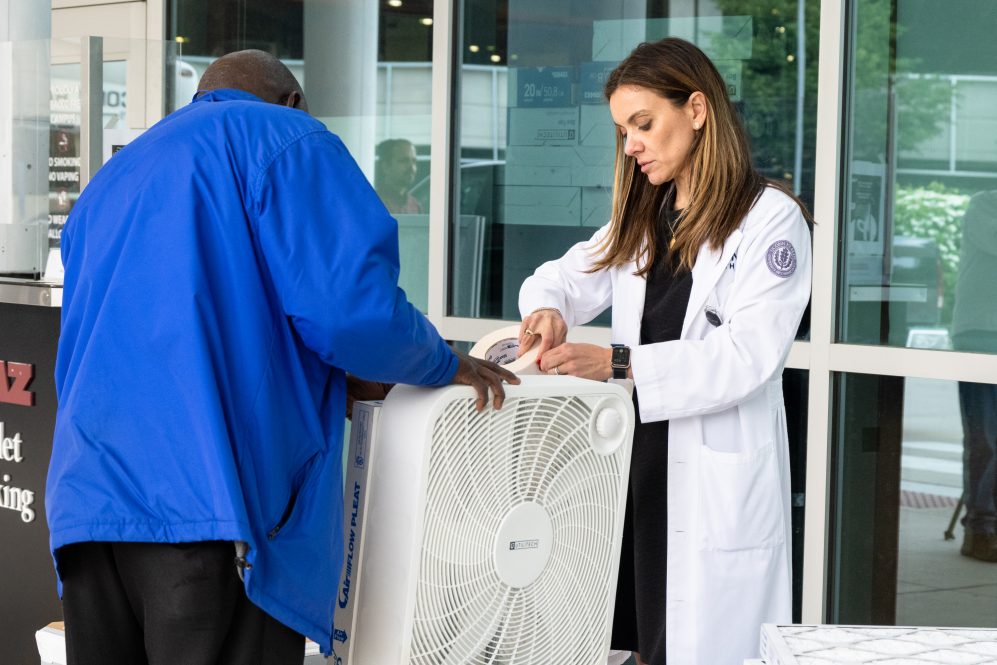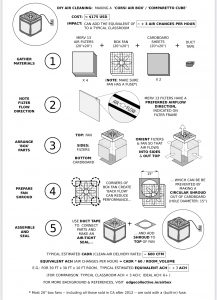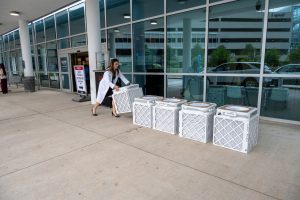
On June 8 and June 9 UConn Health successfully distributed outside its Outpatient Pavilion more than 150 free DIY air filters known as “Corsi Rosenthal” boxes. They were built by volunteering UConn faculty, students, and staff as part of the ongoing cross-campus UConn Indoor Air Quality Initiative launched during the COVID-19 pandemic.
The quickly organized giveaway was a public service by UConn to help protect the Connecticut community’s indoor air quality from the unhealthy particles contained in wildfire smoke. The distribution was first-come, first-serve and included dozens of free, already built air filter devices, as well as dozens of tool kits with the necessary supplies and directions on how to build your own device at home which is 24 x 24 in size. The inexpensive, effective plug-in air purifiers last for 9 to 12 months.
“I am so encouraged that we are able to successfully connect the public with the know-how and ability to access clean air for only $60 worth of materials and 30 minutes of time,” says UConn Health nurse practitioner Marina Creed, APRN, director of The UConn Indoor Air Quality Initiative. “Climate change will only bring about more frequent events like this wildfire smoke that we are experiencing. It is critical that we all know how to protect ourselves. Teaching our community how they can stay safe and prevent illness from exposure to bad air is critical.”
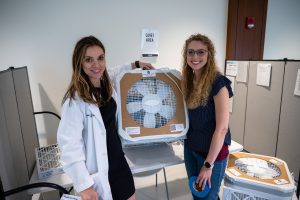
Here are UConn’s simple online directions on how to build your own DIY air filter device for your home, classroom, or community setting with just $60 dollars of materials from your local hardware store and 30 minutes of your time. Also, view a how-to video by UConn School of Engineering students.
“Filters like this allow us to purify the air in our house by reducing the particle concentration,” says Misti Levy Zamora, PhD, assistant professor in the Department of Public Health Sciences at UConn School of Medicine about the devices built by UConn students as part of the UConn Indoor Air Quality Initiative started in 2021 to help battle COVID-19 in the community including in schools. “They all come together and they build hundreds of boxes a semester. We pass these out to the communities. The beautiful thing is that in moments like this we already have these on-hand and we’re able to give these to the community for free.”
The California Department of Public Health recommends the inexpensive DIY tool to its state’s residents as a helpful wildfire air quality intervention. Connecticut’s DPH is also supportive of this indoor air quality mitigation tool.
The collaborative UConn Indoor Air Quality Initiative during COVID-19 was spearheaded by Creed to protect her immunocompromised multiple sclerosis patients and others vulnerable people in the community by building, donating, and studying the power of hundreds of these inexpensive DIY “Corsi-Rosenthal Box” air purifiers. The donated devices have already
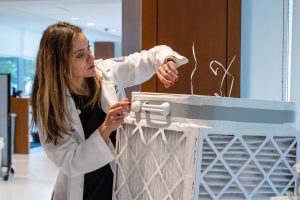
helped improve air health in local CT elementary schools and beyond. Research shows the DIY devices stop the spread of COVID-19 by removing 90% of virus-carrying aerosols from the air.
According to UConn School of Medicine Department of Public Health Sciences experts the DIY air filter devices can help clean the air of the wildfire smoke consisted mostly of tiny particles produced by combustion and suspended in the air. These airborne particles can cause both immediate and long term health effects.
People should be advised to take measures to reduce their exposure, especially if they are in a vulnerable population, such as the elderly, young children or people with respiratory diseases.
The UConn Indoor Air Quality Initiative’s cross-campus collaborators include: UConn Health and its Comprehensive Multiple Sclerosis Center, UConn School of Medicine and its Department of Public Health Sciences, UConn School of Engineering, UConn School of Nursing, Connecticut Area Health Education Center Network (CT AHEC), and the UConn Neag School of Education.
Learn more about the UConn Indoor Air Quality Initiative at: s.uconn.edu/iaq.
How to Build Your Own Air Purifier – Directions: indoorairquality.initiative.uconn.edu/build-your-own/
